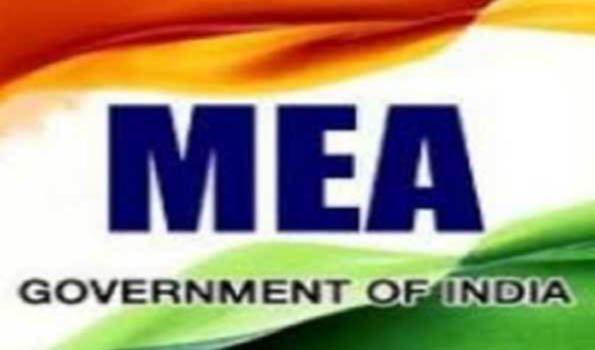New Delhi, June 22 (UNI) India and Bangladesh on Saturday agreed on a joint vision document for the future, on enhancing connectivity, commerce and collaboration for shared prosperity, following talks between Prime Minister Narendra Modi and visiting Bangladesh PM Sheikh Hasina here.
The vision document is for realising the “immense potential of this extra-ordinary relationship and to turn it into a transformational partnership for mutual benefits and prosperity of their people and the entire region”, driven by connectivity, commerce and collaboration.
It recognises both countries “as indispensable partners in realizing our respective national development visions of ‘Viksit Bharat 2047’ and ‘Smart Bangladesh Vision 2041’.
“As a close and valued neighbour with rapidly growing capabilities, Bangladesh is at the converging point of India’s “Neighbourhood First” policy, “Act East” policy, SAGAR doctrine and the Indo-Pacific vision, and an indispensable partner in the development of India’s northeastern region. On the other hand, Bangladesh values its relationship with India as the closest and friendly neighbor. Bangladesh considers India as an important partner in the pursuit of its Neighborhood Foreign Policy for ensuring shared peace and prosperity,” it said.
The two sides will transform their geographical proximity into new economic opportunities, including physical connectivity covering multi-modal transport and cross-border trade and transit infrastructure for seamless cross-border movement of people, goods and services, as well as energy connectivity and digital connectivity.
India will extend transit facilities for movement of Bangladesh goods to Nepal and Bhutan through railway network.
Both sides are committed to early operationalization of the BBIN Motor Vehicle Agreement to promote sub-regional connectivity. “In this context, we welcome a new MOU on Railway Connectivity as well as the decision to commence goods-train service from Gede-Darshana through Chilahati-Haldibari up to Hasimara via Dalgaon railhead (as and when operationalized) at the India-Bhutan border,” it said.
As part of their power and energy collaboration and to develop intra-regional electricity trade, including Nepal and Bhutan, the two sides will expedite the construction of 765 kV high-capacity interconnection between Katihar-Parbatipur-Bornagar with suitable Indian financial assistance, to act as the anchor for our grid connectivity.
Both sides are forging a new paradigm for future-oriented partnership through a “Shared Vision for India-Bangladesh Digital Partnership” and “Shared Vision for India-Bangladesh Green Partnership for a Sustainable Future” in line with the broader Vision of “Viksit Bharat 2047” and “Smart Bangladesh Vision 2041”. These will leverage green and digital technologies to foster economic growth, sustainable and climate-resilient development, environmental conservation, cross-border digital interchange and regional prosperity.
“We will also pursue collaboration in frontier technologies, including civil nuclear, oceanography and space technology. To this end, we will partner in joint development of a small satellite for Bangladesh and its launch using Indian launch vehicle,” it said.
Both sides will strengthen trade and investment linkages, including through early commencement of negotiations for a Comprehensive Economic Partnership Agreement (CEPA), early operationalization of two Special Economic Zones (SEZs) offered by Bangladesh to India in Mongla and Mirsharai, opening of new border-haats, trade facilitation to enhance bilateral trade, improving road, rail, air, and maritime connectivity and trade infrastructure. “We will also encourage and support our private sector to seek new investment opportunities in each other’s priority areas of economic development”.
In the sphere of water resources, the two sides will continue to engage in prioritizing the exchange of data and formulating the framework for interim water sharing based on the recommendations of the Joint Rivers Commission. The two sides welcomed the formation of a Joint Technical Committee to initiate discussions for renewal of the Ganges Water Sharing Treaty of 1996. We will also undertake conservation and management of Teesta River inside Bangladesh with Indian assistance within a mutually agreed timeframe, it said.
Both sides are to strengthen bilateral defence cooperation, and in that respect will explore defence industrial cooperation for modernization of the Armed Forces of Bangladesh, to strengthen their capability for defence. “We will continue to work closely with Bangladesh for our multifaceted military engagements of exercises, training and capability development”.
Both sides will conclude a new Framework Agreement for Development Partnership, and work together to expand capacity building programmes for civil services, judicial officers, police and other specialized services of Bangladesh.
Both sides will nurture the existing cultural and people to people linkages by promoting exchanges of Muktijoddhas, scholars, academics, artistes, tourists, students and youth. “We will further raise the level of our support to the valiant Muktijoddhas and their families, with new programmes for medical and educational support,” it said.
“To facilitate easier cross-border travel and as a supportive gesture to the friendly people of Bangladesh, India will extend e-Medical Visa facility to people from Bangladesh travelling to India for medical treatment. We have agreed to open a new Assistant High Commission of India in Rangpur as a step to facilitate expeditious consular and visa services for the people of north-west region of Bangladesh.”
Based on availability and to the best of its abilities, India will also support Bangladesh with supply of essential commodities.
Both sides reiterated their commitment to a free, open, inclusive, secure, and rules-based Indo-Pacific region.
Recognizing the vulnerability of the region to adverse impacts of climate change, the two sides will co-lead the ‘Disaster Risk Reduction and Management’ pillar of the Indo Pacific Oceans Initiative (IPOI), and cooperate to mitigate disaster risks, build disaster resilient infrastructure, and contribute to the sustenance of their shared maritime region.
We are confident that this Shared Vision for Future will provide further impetus to strengthening our historic ties and building a future-ready partnership by further developing the current ‘Sonaali Adhyaay’ in our bilateral relations, it added.











